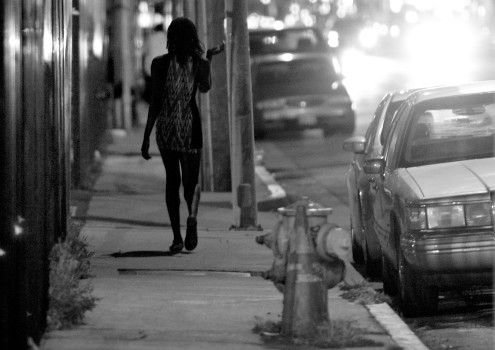
It could be your daughter. Your mother. Your sister.
That’s a key message participants hope to convey at a West Valley anti-human trafficking panel that Soroptimist International of San Fernando Valley is presenting Thursday evening in Canoga Park.
“(With) the homeless, everyone is up and arms everyday because you see it, but the sex trafficking and labor trafficking is kind of an invisible crime that happens through the Internet, through hotels, businesses that are supposed to be legitimate,” said Gwyn Petrick, president of Soroptimist International of San Fernando Valley.
The goal is to give residents the awareness and the tools to help police and victims put an end to these crimes to which the West San Fernando Valley is not immune, she said.
RELATED STORY: Valley human-trafficking task force arrests top 750 in 2017, LAPD says
Sex trafficking and prostitution can happen to a person regardless of one’s socio-economic status, race, gender or age, said Stephany Powell, founder of the Van Nuys-based Journey Out, a nonprofit that assists victims out of sex trafficking and sexual exploitation.
“You’ve had victims that have been approached on college campuses, and you’ve had pimps living on college campuses,” said Powell, who is on Thursday’s panel.
It can be under the guise of a boyfriend or just someone offering to help them make extra money, she said.
A lot of recruitment takes place on social media, including Instagram, and via escort ads.
“That’s why the awareness piece is important,” she added.
Pimps and traffickers know how to manipulate victims by honing in on their particular vulnerabilities, whether it’s their need to be loved or a place to stay.
Many pimps are now preying on victims who are leading a drug-free lifestyle, ambitious and who listen to authority, said Angelica Gomez, a case manager and human anti-trafficking advocate at Journey Out.
They then can groom and coerce them into a lifestyle in which they’ll be reluctant to approach police or their parents.
A pimp can be “a guy that says ‘I love you,’ who is laying in your house, who is intimate with you and has met your family,” Gomez, who is also a panel participant, said.
In the West Valley, hotels in West Hills and Woodland Hills are being used for prostitution and trafficking, she said. Chatsworth also draws women who are in the porn and growing “webcamming” industry, who can be lured or coerced into such activity.
RELATED STORY: Pimps and ‘Johns’ beware: The Valley gets its own human trafficking task force
Many victims of trafficking and prostitution do not report such crimes to the police because they don’t see themselves as victims, Powell said. Others distrust authorities or fear retribution, including deportation, by the trafficker.
Victims can be found in online chatrooms or by Facebook or Instagram followers who are not known to them, said Los Angeles Police Department Detective Martin Pinner of the Operations Valley Bureau Human Trafficking Task Force.
Recruiting is also done on sites such as Craigslist and Backpage, said Pinner, who is also slated to speak Thursday.
“Children, mostly young girls and adult women answer an ad to make money that turns into a job interview with a bad person who has every intention of victimizing them,” he said.
If your daughter is behaving differently than normal, then that’s reason to ask more questions and probe deeper into her life, Pinner said.
Maybe she started dressing differently or has a new cell phone, for example, or is receiving expensive gifts, has a new boyfriend that she won’t let you meet, or is sleeping at different hours, he said.
If your child becomes a victim, he or she may become depressed or even get a tattoo that references money, a name or an image. Parents may also find sexually explicit photos of their children and other people on their phones, he said.
RELATED STORY: LA crackdown on pimps, prostitutes and johns gets new allies: tree trimmers
Aquilina Versoza of the Filipino Workers Center of Southern California noted that labor trafficking is also a significant issue in Los Angeles.
It often involves domestic workers, such as nannies and caregivers, who are brought over from the Philippines or through a business owner, Versoza said. In some cases, they are recruited by an agency and when they arrive their passports are confiscated or they are threatened by deportation or arrest.
Some are working for as little as $200 or $400 a month, she added.
“We have new cases coming in all the time or are being identified by the FBI or other law enforcement agencies that contact us,” she said.
The anti-trafficking panel will start at 6:30 p.m. Thursday at the Rose Goldwater Community Center at 21710 Vanowen St.
Hi! I am a robot. I just upvoted you! I found similar content that readers might be interested in:
https://www.dailynews.com/2018/04/02/how-west-valley-residents-can-fight-sex-and-labor-trafficking/